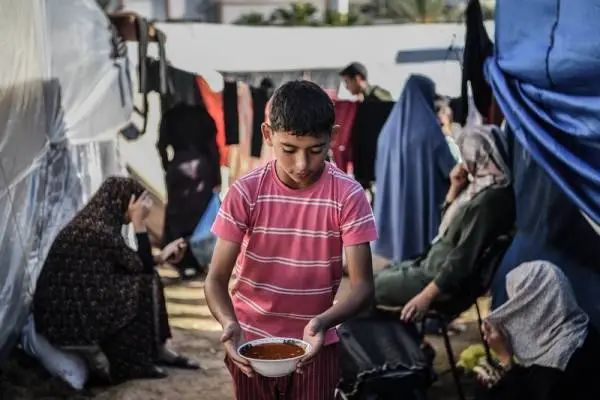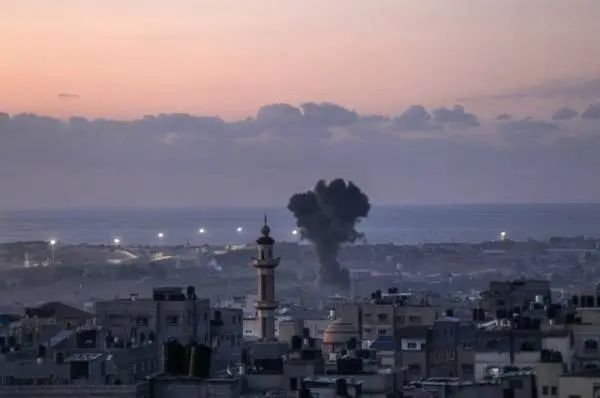导语:
针对以色列方面提出将无限期负责加沙总体安全,清华大学战略与安全研究中心研究员周波日前在《南华早报》发表评论《Why the UN-not Israel-should oversee peacekeeping and security in Gaza》指出,在以色列军事行动进入第二月,以军在加沙大开杀戮之际,最有效的临时措施是各方同意,联合国授权联合国维和部队进驻加沙地带监督停火,保护平民。观察者网受权发布中英文如下:
鉴于以色列与哈马斯之间军力悬殊巨大,以色列大举入侵加沙的结果不难预料。但以色列很难像其国防部长约阿夫·加兰特(Yoav Gallant)发誓的那样将哈马斯"从地球上抹去"。随着平民死亡人数不断的增加,问题是,即使停火后,下一步又该怎么办?
美国前总统奥巴马近日描述巴以冲突为"再度成为热点的百年老毛病"。对付这一顽疾,并没有什么灵丹妙药。
随着以色列对哈马斯的军事行动进入第二个月,以色列总理内塔尼亚胡称,战斗结束后,"以色列将无限期地......负责加沙总体安全"。
但是,以色列军队不可能无限期地驻扎在加沙。对于愤懑于胸的巴勒斯坦人来说,他们不过是占领的入侵者。就连白宫也告诫以色列,重新占领加沙 "不是正确的做法"。

在难民营里艰难度日的巴勒斯坦人(图片来源:ICphoto)
巴勒斯坦民族权力机构长期与以色列政府保持相对合作,可能是接管加沙最合适的选择,但它或许也不愿意。一场摧毁哈马斯的战争也会严重损害巴勒斯坦民族权力机构的声誉。
在“两国方案”前景愈发渺茫的情况下,巴勒斯坦民族权力机构如何能说服巴勒斯坦人,与以色列合作仍有必要?
据彭博社报道,美国和以色列讨论了三种方案:第一种方案是临时让地区国家接管加沙,由美国、英国、德国和法国派遣部队提供支持。
第二种方案是建立一支维和部队,参照在埃及和以色列之间的西奈半岛及其周边地区开展行动的多国观察员部队(MFO)。第三种方案是由联合国临时托管加沙地带。
这些方案都有问题。就第一个方案而言,白宫已经排除了在加沙驻军的可能性。尽管美国是全球维和行动的最大财政捐助国,但它从未真正大规模派出过部队执行此类任务。
即使以色列改变主意,由迄今为止一直支持(尽管并非全心全意)以色列继续作战的国家组成的多边力量,本身也不会得到巴勒斯坦人的信任。
就第二种选择而言,事实证明,监督埃及和以色列和平的多国观察员部队非常有效和成功,但这是因为两国都强烈希望实现持久的和平。
目前没有迹象表明任何阿拉伯国家或国家联盟,比如埃及或沙特阿拉伯,会愿意承担维护一个被苦难和仇恨吞噬的战乱地区的稳定的重任。
第三种选择尽管存在固有的问题,却带来了新的希望。建立维和部队需要得到有关各方的同意。但谁是这场冲突的当事方呢?以色列肯定不会允许哈马斯成为其中一方。
1993年《奥斯陆第一协议》签署后,巴勒斯坦民族权力机构和以色列有条件地承认了对方对特定地区的管理权。以色列能否接受巴勒斯坦民族权力机构作为另一方,即使这意味着承认后者具有更大程度的主权和国家地位?

遭遇空袭的加沙地带(图片来源:ICphoto)
另一个问题是,如何让以色列信任联合国?以色列与联合国关系长期不和。在联合国秘书长古特雷斯称哈马斯10月7日的袭击 "并非在真空中发生"之后,以色列反对派领导人本尼·甘兹(Benny Gantz)称古特雷斯在"为恐怖主义辩护"。哈马斯则很可能将任何维和行动视为另一种占领,并采取暴力行动。
但是,这个方案看起来还是最实际的。联合国很少阻止过战争的发生,但通过维和行动收拾残局却有经验。联合国安理会授权的行动具有极高的合法性。当各方通过外交达成一致,联合国安理会应该能授权在世界上最脆弱、最动荡的地区之一建立特派团。
中东是维和行动的孵化器。第一个联合国维和特派团始于1948年阿以停火。如今,在以色列边境相邻地区,联合国有超过10,000名维和人员在黎巴嫩和叙利亚开展行动。
这两个特派团都负责监督以色列与其两个邻国之间的停火,包括沿黎巴嫩南部边境的 "蓝线 "巡逻,以及监督以色列从叙利亚吞并的戈兰高地赫尔蒙山等地区。
联合国维和部队人数绰绰有余。尽管近年来紧张局势和冲突不断加剧,但全球维和行动规模却在缩减。因此,与2015年部署在16个特派团的12.5万名联合国维和人员相比,目前只有12个特派团,共计约9万名维和人员。
例如,中国有8000名联合国维和士兵在待命,但目前部署的中国维和部队只有两千多人。
能最有效在加沙执行任务的维和部队是联合国的“先锋旅”。联合国 “先锋旅”由 4000 名快反部队组成,他们都是从成员国中精挑细选出来的。他们可以在 60 天内被派往动乱地区,以保护平民为第一要务。考虑到加沙已经发生的巨大人员伤亡,我们不难想象那里是多么需要这样的维和部队。
但是,无论维和行动多么有用,在最终政治解决巴以问题之前,它都只是一种临时措施。10月7日哈马斯发动袭击后,以色列总统伊萨克·赫尔佐格(Isaac Herzog)曾表示“悲剧是以色列生活的一部分”。为了结束悲剧,以色列需要考虑如何以及何时允许巴勒斯坦人有朝一日拥有自己的家园。
翻译:李泽西
校译:韩桦
本文中文版11月22日首发于“观察者网”
Why the UN-not Israel-should oversee peacekeeping and security in Gaza
The outcome of Israel’s sweeping invasion of Gaza is not hard to tell. Israel’s military strength is overwhelmingly superior to that of Hamas. But Hamas can hardly be wiped “off the face of the Earth”, as Israeli Defence Minister Yoav Gallant has vowed. The question is, amid mounting civilian deaths, what to do even after a ceasefire?
There is no panacea to what former American president Barack Obama recently described as “century-old stuff that’s coming to the fore”.
As the Israeli military campaign against Hamas entered its second month, Prime Minister Benjamin Netanyahu said: “Israel will, for an indefinite period … have the overall security responsibility” in Gaza once the fighting is over.
But Israeli troops can ill afford to stay indefinitely in Gaza where, to resentful Palestinians, they are but occupying invaders. Even the White House has told Israel that reoccupying Gaza is “not the right thing to do”.
The Palestinian Authority that has maintained relative cooperation with the Israeli government might be the most suitable candidate for taking over, but it could be reluctant too. A war that destroys Hamas would also seriously discredit the Palestinian Authority.
With the probability of a two-state solution even more remote, how can it convince Palestinians that cooperation with Israel is still necessary?
According to Bloomberg, the US and Israel have discussed three options: the first is to grant temporary oversight of Gaza to countries from the region, backed by troops from the United States, Britain, Germany and France.
The second is a peacekeeping force, modelled on the Multinational Force and Observers (MFO) group that operates on and around the Sinai Peninsula between Egypt and Israel. The third would be temporary governance of the strip under a UN umbrella.
None of these options looks perfect. On the first option, the White House has ruled out stationing US troops in Gaza. Despite being the largest financial contributor of global peacekeeping, the US has never really sent out large troops for such missions.
Even if it changes its mind, such a multilateral force from countries that have so far supported, albeit not wholeheartedly, Israel’s no-ceasefire determination, simply won’t be trusted by the Palestinians in the first place.
On the second option, the MFO group overseeing peace between Egypt and Israel has proven highly effective and successful. But this is because both countries hold a strong desire for durable and lasting peace.
It is far from certain that any Arab nation, say Egypt or Saudi Arabia, or even a group of Arab countries, would wish to bear the brunt of stabilising a war-torn area engulfed by misery and hatred.
The third option ushers in new light, in spite of inherent problems. Establishing a peacekeeping mission requires the consent of the parties involved. But who are the parties in this conflict? Israel will surely not allow Hamas to be one.
Following the Oslo I Accord in 1993, the Palestinian Authority and Israel conditionally recognised each other’s right to govern specific areas. Can Israel accept the Palestinian Authority as the other party, even if it implies a greater degree of sovereignty and statehood?
The other thing is how Israel might trust the UN, with which it has long-troubled relations. Israeli opposition leader Benny Gantz labelled UN Secretary General Antonio Guterres a “terror apologist” after Guterres argued that the October 7 attacks by Hamas “ did not happen in a vacuum”. And Hamas is likely to see any peacekeeping mission as just another type of occupation and respond with violence.
Still, this option looks the most practical. The UN has seldom succeeded in stopping a war, but its peacekeeping operations have experience with cleaning up the mess. The legitimacy of UN Security Council mandates is second to none. With the consent of the parties – hopefully worked out through diplomacy – the UN Security Council would presumably have no problem in agreeing to establish a mission in one of the world’s most fragile and volatile regions.
The Middle East is the incubator of peacekeeping. The first UN peacekeeping mission started with the Arab-Israel ceasefire in 1948. Today, the UN has more than 10,000 peacekeepers along Israel’s border regions, with operations in Lebanon and Syria.
Both missions monitor the ceasefire between Israel and its two neighbours, from patrolling the “ Blue Line” along Lebanon’s southern frontier, to monitoring such areas as Mount Hermon in the Golan Heights, which Israel annexed from Syria.
The UN has more than enough troops to deploy. Despite growing tensions and conflicts in recent years, peacekeeping around the globe is shrinking. As a result, there are only 12 missions and about 90,000 personnel, down from the 125,000 UN peacekeepers deployed across 16 missions in 2015.
The UN has more than enough troops to deploy. Despite growing tensions and conflicts in recent years, peacekeeping around the globe is shrinking. As a result, there are only 12 missions and about 90,000 personnel, down from the 125,000 UN peacekeepers deployed across 16 missions in 2015.
The most useful peacekeepers that could be sent to a would-be Gaza mission would be the UN’s “vanguard brigade” of 4,000 rapidly deployable troops, selected from member states. They can be dispatched within 60 days to troubled spots with protection of civilians as their first priority. Given the huge loss of life in Gaza, one can easily imagine how such peacekeeping troops are badly needed over there.
But however useful peacekeeping may be, it is but an ad hoc measure pending a final political solution. After the October 7 Hamas attacks, Israeli President Isaac Herzog said that “tragedy is part of Israeli life”. To end the tragedy, Israel needs to think about how and when the Palestinians can have their own homeland one day.
This article was first published on South China Morning Post on Nov.11, 2023.

